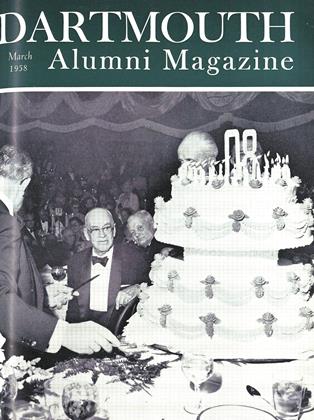More About the Coast
In response to his letter in the December issue, concerning the origins of the Barbary Coast Orchestra, H. S. Baketel Jr. '20 received the following:
DEAR SHERRY:
I received your letter to the editor relative to the start of the jazz band with great interest. Perhaps the following, as well as I remember `it, will help set the history straight.
During our freshman year Breg and I took turns playing dances in the hall over the old Post Office with Jimmy Parkes as the trap drummer—that was the complete band, just two pieces. I was also doing a spell in a restaurant, playing now and then with Gyp Green and Slats Baxter, both of whom taught me all I knew on the tenor guitar and banjo. In the spring of 1917, I believe it was, we decided to organize a band and a few of us got jobs playing for meals at the Wheelock Club. In fact, it was the "Dartmouth Five" as you see inscribed on Jimmy Parkes' drum in the attached photo.
As jobs got more frequent and better, we expanded into the group you see in the picture. We then called ourselves the Dartmouth Jazz Band and built up our reputation under that name to such a point that in the early winter of 1918, I believe, Governor Cox invited us to play at the Smileage Ball at the Copley Plaza in Boston to help raise money for Liberty Bonds. By using the name Dartmouth, Craven warned us we were a recognized College activity and, as such, subject to the rules and regulations - one of which was that a person had to be up in his studies. Since two of the members were on probation it meant only part of the band could go. We had a commitment so decided it was all or nothing despite the warning. Result - two busted out - rest put on probation for 18 months! It was worth it, as we had a helluva time - did a lot of good for Dartmouth and the war effort. In fact, we made such a reputation that the ban was lifted the following year although we had to change the name. That was the beginning of the new name of Barbary Coast Band. Spike Hamilton joined us his freshman year and continued on after our graduation.
Washington, D. C.
Barbary Coast History
To THE EDITOR:
Since I am one of the original members of the group that eventually took the name Barbary Coast," I think I can give you the information requested in your letters column in the December 1957 issue.
I entered Dartmouth in September 1916 as a member of the Class of 1920. At that time I had been playing "traps" for some time and I was offered a job in the Wheelock Club, an eating club on West Wheelock Street, where they wanted some music played during mealtime. They hired at the same time another young fellow, Vincent Breglio '20, who played the piano. With us we had another fellow who played the violin.
We three played for a few months together and then we began to add members to our band, all from the Class of 1920; our violin player, who was not a member of our class, dropped out. The third addition to the 1920 group in the Wheelock Club was Sal Andretta, a fine piano player and an excellent man with a banjo. Paul Sample '20, with his saxophone, and Jim Reber '20, a banjo player, were the next men to join us.
By this time, we had a band that began to attract attention and we played outside of Hanover for dances in White River, West Lebanon and other adjacent towns. We decided we wanted a name for our band; and since we were all members of the Class of 1920, the name we adopted for this group was "The 1920-Five."
When the time came for Winter Carnival in February 1917, we played for some fraternity dances, one of which I remember was at the "Phi Gam" House.
Shortly after this Winter Carnival in 1917, Paul Sample's brother "Dinney" joined our group with his saxophone and later on Bill Terry joined the band, which by that time was getting a lot of work and we added some other men who were not in our class, such as Harry Worthington, who played the banjo, and "Gib" Green, who was also a banjo player. This is the group that became known as the Barbary Coast Band, which name was adopted somewhere along the line, but it really had its inception in the old Wheelock Club in September 1916. In 1956, at the 35th delayed reunion of the Class of 1920, Sal Andretta and myself, playing piano and banjo respectively, put on a little exhibition for our class dinner in the Hanover Inn, as we were the only two members of the original group present.
Red Bank, N. J.
 View Full Issue
View Full Issue
More From This Issue
-
 Feature
FeatureThe State of Our Purposes ... and Vice Versa
March 1958 -
 Feature
FeatureA Spot of Green at Knob Lake
March 1958 By ALAN COOKE '55 -
 Feature
FeatureA BIG NIGHT AT THE WALDORF
March 1958 -
 Feature
FeatureAlumni Council Has Record Attendance
March 1958 -
 Class Notes
Class Notes1918
March 1958 By ERNEST H. EARLEY, W. CURTIS GLOVER, RICHARD P. WHITE -
 Class Notes
Class Notes1930
March 1958 By RICHARD W. BOWLEN, WALLACE BLAKEY, JOHN F. RICH







